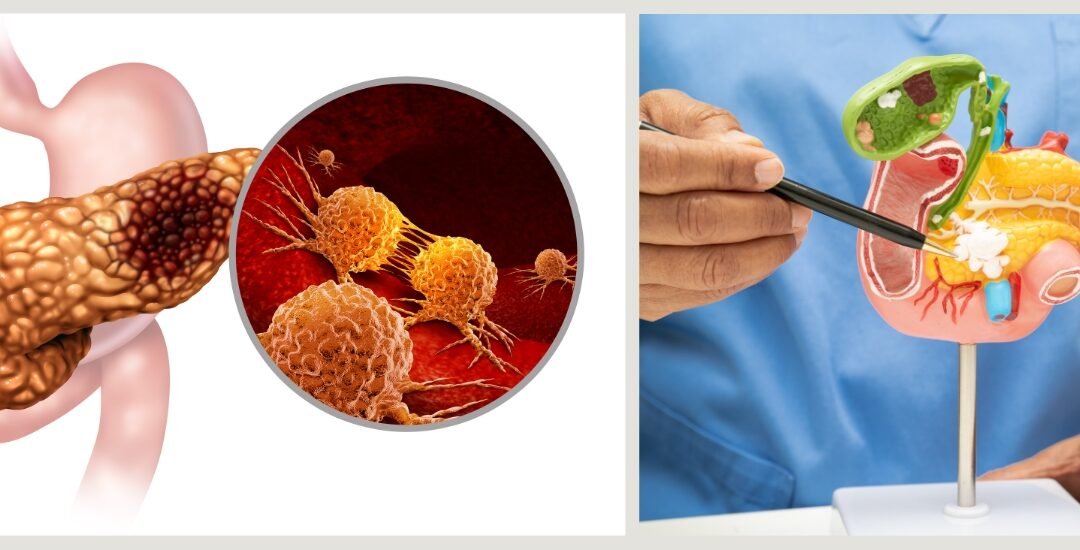Pancreatic adenocarcinoma is one of the most aggressive and deadly forms of cancer, largely because it often goes undetected until advanced stages. Unlike other cancers that present with noticeable symptoms early on, this disease tends to remain silent—making it even more important to understand the potential causes and risk factors.
While no single cause explains all cases of pancreatic adenocarcinoma, research has uncovered several genetic, environmental, and lifestyle-related contributors that may increase your risk. Recognizing these can help you and your loved ones stay proactive about your health.
Table Of Contents
- What Is Pancreatic Adenocarcinoma?
- How Pancreatic Cancer Develops
- Common Pancreatic Adenocarcinoma Causes
- Genetic And Inherited Risk Factors
- Lifestyle And Environmental Triggers
- Who Is Most At Risk?
- Can Pancreatic Cancer Be Prevented?
- When To See A Doctor
- Call To Action
- Final Thoughts
1. What Is Pancreatic Adenocarcinoma?
Pancreatic adenocarcinoma is a type of cancer that begins in the exocrine cells of the pancreas—the cells responsible for producing digestive enzymes. It is the most common form of pancreatic cancer and typically starts in the ducts that carry these enzymes to the small intestine.
This cancer is known for its fast growth and tendency to spread before symptoms become apparent, making early detection critical but difficult.
2. How Pancreatic Cancer Develops
Cancer begins when cells in the pancreas start to grow uncontrollably due to genetic mutations or damage. Over time, these abnormal cells can form tumors and invade nearby tissues or spread to distant organs.
Many of these mutations may be triggered by chronic inflammation, toxin exposure, or inherited genetic defects. Understanding the underlying causes helps clarify who is at higher risk and what steps might reduce that risk.
3. Common Pancreatic Adenocarcinoma Causes
There is no single cause, but several known contributors have been identified:
- Smoking: Cigarette smoking is one of the strongest and most consistent risk factors.
- Chronic pancreatitis: Long-term inflammation of the pancreas can increase cellular damage and cancer risk.
- Type 2 diabetes: Especially if newly diagnosed after age 50, diabetes has been linked to increased risk.
- Obesity: Excess weight may alter hormone levels and create a cancer-friendly environment.
- Diet: Diets high in processed meats and low in fruits and vegetables may contribute to pancreatic cancer risk.
- Age: Most cases occur in people over 60.
- Gender: Men are slightly more likely to develop the disease than women.
These causes often work together rather than independently, amplifying the potential for cellular mutation and cancer formation.
4. Genetic And Inherited Risk Factors
Some people are born with gene mutations that significantly raise their risk of pancreatic cancer. These include:
- BRCA1 and BRCA2 mutations (also linked to breast and ovarian cancer)
- Lynch syndrome
- Familial pancreatic cancer history
- Peutz-Jeghers syndrome
While these inherited conditions are rare, they highlight the importance of family history in understanding your cancer risk. People with these syndromes may benefit from earlier screening and more aggressive preventive measures.
5. Lifestyle And Environmental Triggers
Beyond genetics, lifestyle and exposure-related factors can also contribute:
- Heavy alcohol use: May lead to pancreatitis, which in turn increases cancer risk.
- Exposure to industrial chemicals: Workers in metal, dye, or petroleum industries may face elevated risks.
- Sedentary lifestyle: Physical inactivity is linked to obesity and inflammation—two major cancer risk factors.
- Poor nutrition: Diets lacking antioxidants and anti-inflammatory foods may reduce your body’s ability to repair DNA damage.
While not all environmental risks are avoidable, reducing exposure to known triggers can help lower your chances of developing pancreatic cancer.
6. Who Is Most At Risk?
You may be more likely to develop pancreatic adenocarcinoma if you smoke, are over the age of 60, or have a family history of pancreatic or related cancers. Other high-risk factors include obesity, chronic pancreatitis, type 2 diabetes, and inherited genetic mutations. If you fall into multiple risk categories, it’s crucial to watch for early symptoms and discuss screening with your doctor.
7. Can Pancreatic Cancer Be Prevented?
While there’s no guaranteed way to prevent pancreatic cancer, lifestyle changes can help lower your risk. Quitting smoking, maintaining a healthy weight, eating a nutrient-rich diet, limiting alcohol, and staying physically active all contribute to prevention. For those with a strong family history, genetic counseling may also provide useful insight and monitoring strategies.
8. When To See A Doctor
Pancreatic cancer is often called a “silent disease” because symptoms usually don’t appear until it’s advanced. However, early signs like upper abdominal or back pain, unexplained weight loss, yellowing of the skin (jaundice), appetite loss, or ongoing fatigue should not be ignored. If these symptoms persist—especially with known risk factors—consult a healthcare provider promptly.
9. Call To Action
Concerned about your risk for pancreatic cancer? Visit a walk-in clinic near you for guidance, risk assessment, and a referral if necessary. At Walk In PCP, we’re here to help you take the next step toward prevention and peace of mind.
10. Final Thoughts
Understanding the causes of pancreatic adenocarcinoma empowers you to take control of your health. While this cancer is often aggressive and hard to detect early, recognizing the risk factors can lead to earlier intervention and better outcomes.
If you or someone you love is at risk, don’t wait—talk to a provider and explore your options for prevention and screening.
Disclaimer
This article is for informational purposes only and does not substitute professional medical advice, diagnosis, or treatment. Always consult your healthcare provider regarding any concerns about cancer risk or symptoms.
